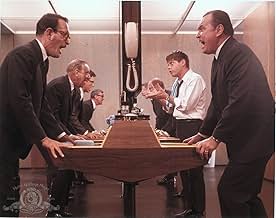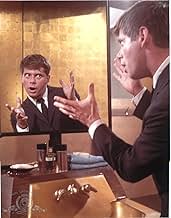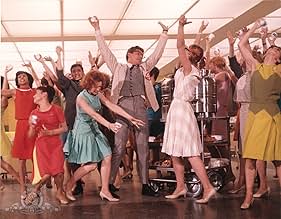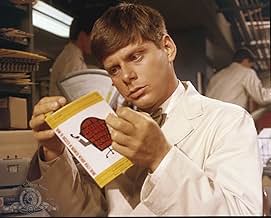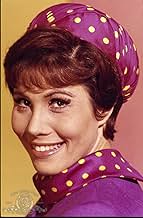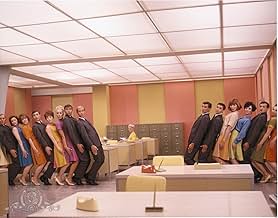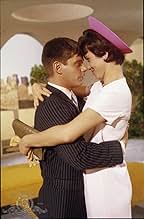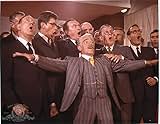Comment réussir dans les affaires sans vraiment essayer
Titre original : How to Succeed in Business Without Really Trying
- 1967
- Tous publics
- 2h 1min
NOTE IMDb
7,2/10
5,4 k
MA NOTE
J. Pierpont Finch laveur de vitre achète un livre décrivant comment réussir dans le monde des affaires. Il se met aussitôt à essayer les méthodes données...J. Pierpont Finch laveur de vitre achète un livre décrivant comment réussir dans le monde des affaires. Il se met aussitôt à essayer les méthodes données...J. Pierpont Finch laveur de vitre achète un livre décrivant comment réussir dans le monde des affaires. Il se met aussitôt à essayer les méthodes données...
- Réalisation
- Scénario
- Casting principal
- Récompenses
- 2 nominations au total
Anthony 'Scooter' Teague
- Bud Frump
- (as Anthony Teague)
Kathryn Reynolds
- Miss Smith aka Smitty
- (as Kay Reynolds)
Jeff DeBenning
- Gatch
- (as Jeff Debenning)
Avis à la une
This was one of the rare Broadway musicals whose book is actually more interesting than its score. So while roughly a half-dozen Frank Loesser songs from the stage version are deleted, they're not really missed. What survives is a witty skewering of office politics, featuring much of the Broadway cast. And while such '60s business staples as rampant sexism and smoking now look quaintly offensive, the gleeful satirizing of backstabbing and skulduggery in business will always be relevant. David Swift, whose training was in TV, doesn't do much with the widescreen format (except for the ingenious ballet-mechanique in "A Secretary Is Not a Toy"), but he cuts cleverly away from the production numbers just as the musical-comedy silliness is on the verge of becoming embarrassing, and he splices in some delectable location shots of '60s New York. The color scheme is bright, the pacing brisk, the cast friendly, the production values refreshingly modest. At a time in movie history when so many adaptations of stage hits were overbudgeted and overlong, what a pleasure to see something to faithful to its source material -- and so unpretentious.
Except for four songs being dropped and a slight altering of the original story's pacing, this is a flawless translation of a Broadway classic to the big screen, making great use of New York locations and retaining Robert Morse in the best role of his entire career as the ambitious window washer J. Pierrepoint Finch who climbs his way up the corporate ladder by every little trick in a book that the musical takes it's title from. Morse's timing and delivery is perfect and everyone who's played the part of Finch since on Broadway (most notably Matthew Broderick a few years back) have had to emulate his basic approach to the part.
Michele Lee is also perfect as the secretary Rosemary who is madly in love with Finch. Her sexy solo of "I Believe In You" (a vast improvement over the stage's "Happy To Keep His Dinner Warm") makes you wish she hadn't given up Broadway for TV success because she has one of the best singing voices you'll ever hear.
Michele Lee is also perfect as the secretary Rosemary who is madly in love with Finch. Her sexy solo of "I Believe In You" (a vast improvement over the stage's "Happy To Keep His Dinner Warm") makes you wish she hadn't given up Broadway for TV success because she has one of the best singing voices you'll ever hear.
HOW TO Succeed IN BUSINESS WITHOUT REALLY TRYING is the 1967 film version of the Pulitzer Prize winning 1960 Broadway musical that broke Broadway box office records and made a star out of Robert Morse. Morse was thankfully allowed to recreate his Broadway role in this exuberant film version as J. Pierpont Finch, an ambitious young window washer who, through the aid of the title book, cleverly manages to work his way up the corporate ladder at World Wide Wickets, Inc. Morse lights up the screen in the best role of his career. He sadly never really got a role of this caliber again and I've never been able to figure out why. He gives a smart and brassy performance and is well-supported by 20's crooner Rudy Vallee, also reprising his Broadway role as company president JB Biggley and Michele Lee as devoted secretary/girlfriend Rosemary Pilkington. There is also standout work by Anthony Teague as company brown-noser Bud Frump and Maureen Arthur as Miss La Rue, Biggley's outspoken mistress whose physicals assets clearly outweigh her secretarial skills. David Swift's fast-paced direction is a plus as is Bob Fosse's inventive choreography. Sadly, the original score has been severely tampered with and several great songs from the stage show have been cut, but we still have "How to", "The Company Way", "A Secretary is not a Toy", "It's been a long day", and the show's most famous song, "I Believe in You." A clever and entertaining screen adaptation of a classic Broadway musical.
The longer I watched the movie the more convinced I became that the world of business in 2006 is the same as it was in 1967. Robert Morse as J.P. Finch finds a self-help book that he uses as his guide to get ahead in the corporate world. Nothing different there than now. Go to any bookstore and there are an amazing number of "how to" books simply written and easily read (don't get me wrong, many are indeed very good).
J.P. Finch follows every page's instructions very carefully. He learns how to utilize people's weaknesses to promote himself. Along the way he sings several quite original songs that are quite entertaining and definitely add to the story.
It was evident that everyone making the movie was having a good time. Yet they took their roles seriously and did not overplay their roles. The comedy is high level and the satire is nothing less than brilliant.
J.P. Finch follows every page's instructions very carefully. He learns how to utilize people's weaknesses to promote himself. Along the way he sings several quite original songs that are quite entertaining and definitely add to the story.
It was evident that everyone making the movie was having a good time. Yet they took their roles seriously and did not overplay their roles. The comedy is high level and the satire is nothing less than brilliant.
Today, at 77 years old, Robert Morse is still going strong as Mad Men's Cooper, but there's no question that his heyday was the late '50s to the early '70s, when his toothy grin, amiable tenor and boyish acting made him the toast of Broadway. Here, he repeats his Broadway success as J. Pierpont Finch in "How to Succeed In Business Without Really Trying," a 1967 film also starring Michele Lee, Rudy Vallee, and Anthony Teague. Lee and Vallee also repeat their Broadway roles.
With music and lyrics by Frank Loesser and book by Abe Burrows, "How to Succeed" is the story of window washer J. Pierpont Finch, who in a matter of days, thanks to a book he carries around by the same name as the film title, has risen through the ranks of the Worldwide Wicket Company without doing any work. He has his enemies, but one very good friend in Rosemary (Lee), a secretary with a crush on him who wants Ponty, as he is called, to make good.
I'm not all that familiar with the musical, but I understand that there are several songs missing, including "Happy to Keep His Dinner Warm." The standouts are "I Believe in You," which became a hit song, and the rousing "Brotherhood of Man." What makes the music for me is the wonderful orchestrations.
Sexist today in some of its themes, this is a brightly-colored musical, done the old-fashioned way, without cutting the numbers to pieces. Morse is delightful and never had any trouble adapting to film. Ditto a young, pretty Lee who sings "I Believe in You" like a dream. Vallee is well cast as the head of the company who has a girlfriend on the side. Anthony Teague is very good as the boss' nephew, but Charles Nelson Reilly played this role on stage, and I can only imagine how hilarious he was in the role.
Good movie, and director David Swift keeps the pace moving.
With music and lyrics by Frank Loesser and book by Abe Burrows, "How to Succeed" is the story of window washer J. Pierpont Finch, who in a matter of days, thanks to a book he carries around by the same name as the film title, has risen through the ranks of the Worldwide Wicket Company without doing any work. He has his enemies, but one very good friend in Rosemary (Lee), a secretary with a crush on him who wants Ponty, as he is called, to make good.
I'm not all that familiar with the musical, but I understand that there are several songs missing, including "Happy to Keep His Dinner Warm." The standouts are "I Believe in You," which became a hit song, and the rousing "Brotherhood of Man." What makes the music for me is the wonderful orchestrations.
Sexist today in some of its themes, this is a brightly-colored musical, done the old-fashioned way, without cutting the numbers to pieces. Morse is delightful and never had any trouble adapting to film. Ditto a young, pretty Lee who sings "I Believe in You" like a dream. Vallee is well cast as the head of the company who has a girlfriend on the side. Anthony Teague is very good as the boss' nephew, but Charles Nelson Reilly played this role on stage, and I can only imagine how hilarious he was in the role.
Good movie, and director David Swift keeps the pace moving.
Le saviez-vous
- AnecdotesThe scene featuring Robert Morse skipping & dancing down the street on his way to work (immediately after the "Old Ivy" fight song duet with Rudy Vallee ) was filmed on location in New York City using hidden cameras and a small earpiece to cue Morse on his timing. The various amused & astonished passersby were not extras, but rather were New Yorkers reacting genuinely to someone dancing to his own tune. It may be noted that, in typical New York fashion, no matter how odd he appeared to be virtually none of the New Yorkers paid him any notice whatsoever.
- GaffesDuring opening credits number, Robert Morse and a young fellow window washer board an electric scaffolding in exterior rooftop shot, but by next scene when scaffolding has descended a few floors, co-worker is now a much older man with much less hair.
- Citations
J. B. Biggley: I know blood is thicker than water, but Bud Frump is thicker than anything. I'll promote him when I'm ready. Now, you listen to me, Gertrude. The next time Bud complains to his mother, and she calls you, and you call me, you're all fired. Damn it.
- Versions alternativesThe 1998 VHS release contained the 1994 variant of the United Artists logo.
- ConnexionsFeatured in MGM/UA Home Video Laserdisc Sampler (1990)
Meilleurs choix
Connectez-vous pour évaluer et suivre la liste de favoris afin de recevoir des recommandations personnalisées
Détails
- Date de sortie
- Pays d’origine
- Langue
- Aussi connu sous le nom de
- Como triunfar en los negocios sin realmente tratarlo
- Lieux de tournage
- Société de production
- Voir plus de crédits d'entreprise sur IMDbPro
Box-office
- Montant brut aux États-Unis et au Canada
- 6 322 000 $US
- Durée2 heures 1 minute
- Couleur
- Rapport de forme
- 2.35 : 1
Contribuer à cette page
Suggérer une modification ou ajouter du contenu manquant


